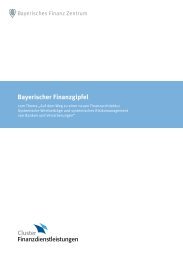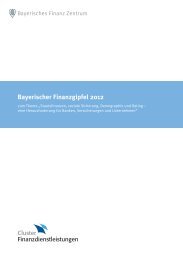Bayerischer Finanzgipfel
Bayerischer Finanzgipfel
Bayerischer Finanzgipfel
Erfolgreiche ePaper selbst erstellen
Machen Sie aus Ihren PDF Publikationen ein blätterbares Flipbook mit unserer einzigartigen Google optimierten e-Paper Software.
18<br />
Bayerisches Finanz Zentrum<br />
Bayerisches Finanz Zentrum<br />
Bayerisches Finanz Zentrum<br />
If one takes into account the important role attributed to external ratings in the regulations<br />
of Basel II, it seems very questionable that a more stable financial architecture can<br />
be achieved as long as rating agencies remain in private hands. While it will be possible<br />
to improve the performance by a better code of conduct (CRA Code of Conduct 2008 by<br />
the International Organization of Securities Commissions 1 ) and a public regulation of<br />
rating agencies, it seems almost impossible to overcome the fundamental problem of an<br />
asymmetric incentive structure of private rating agencies that operate in an oligopolistic<br />
environment without any liability for their ratings.<br />
Hayek and the Rationale of Public Rating Agencies<br />
The obvious alternative is a state-owned credit rating agency. Without a profit motive the<br />
incentives would no longer be biased. Of course, if ratings are given by a public institution<br />
the governments would be responsible for mistakes in the rating process. But as the<br />
current crisis shows, governments are already now obliged to bail-out banks that have<br />
relied on the ratings of private institutions. Ratings by public institutions would thus be<br />
consistent with the principle of competence and liability. The shift from private to public<br />
agencies could induce a relatively conservative rating culture but given the huge social<br />
costs of imprudent ratings by private agencies such a conservative bias is exactly the<br />
element of stability that is required for a more robust financial architecture. The case for<br />
public credit rating agencies can also be made by referring to Friedrich A. Hayek’s fundamental<br />
justification of the market mechanism. In his famous American Economic Review<br />
article, he writes: “If we can agree that the economic problem of society is mainly one of<br />
rapid adaptation to changes in the particular circumstances of time and place, it would<br />
seem to follow that the ultimate decisions must be left to the people who are familiar<br />
with these circumstances, who know directly of the relevant changes and of the resources<br />
immediately available to meet them. We cannot expect that this problem will be solved<br />
by first communicating all this knowledge to a central board which, after integrating all<br />
knowledge, issues its orders. We must solve it by some form of decentralization”. 2 Thus<br />
for Hayek, the rationale for the market and private agents rests fundamentally on their<br />
advantages in terms of gathering and processing decentralized pieces of information.<br />
But this justification does not apply to rating agencies. A global financial system with<br />
only three major agencies comes very close to Hayek’s model of central planning: “The<br />
statistics which such a central authority would have to use would have to be arrived at<br />
precisely by abstracting from minor differences between the things, by lumping together,<br />
as resources of one kind, items which differ as regards location, quality, and other particulars,<br />
in a way which may be very significant for the specific decision. It follows from<br />
this that central planning based on statistical information by its nature cannot take direct<br />
account of these circumstances of time and place”. In other words, there is no reason to<br />
assume that the three major private rating agencies have any advantage over a state-







